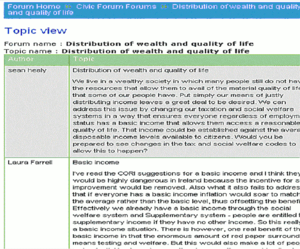Difference between revisions of "Deliberation"
| Line 5: | Line 5: | ||
If you want to get the reactions of different people to each others views on an issue, and get some reflection as well as immediate argument, then online deliberation is what you need. | If you want to get the reactions of different people to each others views on an issue, and get some reflection as well as immediate argument, then online deliberation is what you need. | ||
| − | If you don't need discussion and reactions, but just the ordinary opinions of people who haven't deliberated on a subject, then | + | If you don't need discussion and reactions, but just the ordinary opinions of people who haven't deliberated on a subject, then use online surveys for [[measuring needs and preferences]] or collect their stories for [[identifying issues]]. |
*ongoing discussions | *ongoing discussions | ||
Revision as of 22:23, 17 July 2006
For more subtle, and less rushed deliberation, arrange ongoing discussions, rather than quick chats. Any technology that facilitates a relay of responses or conversations can be used. Dialogue can be public—-in an open environment which anyone can join-—or private-—between selected groups of participants.
Some years ago David Newman studied how students discussed controversial issues online and in face-to-face seminars.[1] It turned out that discussion forums helped people link ideas together and justify them. There were fewer distractions than in face-to-face meetings, and the online record let people reflect on the issues, and write in a more deliberative style.
If you want to get the reactions of different people to each others views on an issue, and get some reflection as well as immediate argument, then online deliberation is what you need.
If you don't need discussion and reactions, but just the ordinary opinions of people who haven't deliberated on a subject, then use online surveys for measuring needs and preferences or collect their stories for identifying issues.
- ongoing discussions
- these allow people to take part in a longer discussion over several days or weeks, joining in whenever they have time.
- E.g. discussion forums, e-mail mailing lists and virtual worlds.
- Electronic mailing list
- all subscribed individuals automatically receive e-mails sent to the list
- Newsletters - email information releases - one to many
- subscribe a newsletter - Dublin City Council News
- newsletter archive -
- E-mailing list - many to many
- E-mailing list archive - E-democracy.org: Brighton & Hove, Minnesota Politics Discussion (Yahoo Groups)
- creating an e-mailing list
- E-mailing list software: Mailman, Sympa and GroupServer, etc.
- Discussion forums
- an on-line service that allows registered users to post questions and responses to other posted questions. In a discussion forum participants with common interests can exchange open messages and develop their arguments.
- AdviceNI - Tax Credit Overpayments
- Dublin.ie - city community forum
- creating your own discussion forum
old notes
- these allow people to take part in a longer discussion over several days or weeks, joining in whenever they have time - e.g. discussion forums, e-mail mailing lists, e-newsletter and virtual worlds.
Electronic mailing list
- Newsletters - one to many
- 1-2-ALL Broadcast E-mail Software
- AdvoKit
- e-Campaign
- Interspire SendStudio
- PHPList
- E-mailing list - many to many
- Adaptive Mailing List
- Arrow Mailing List Server
- Dada Mail
- DoList
- Ezmlm
- GroupServer
- Infacta GroupMail
- ListServ
- Mailman
- MajorDomo
- Sympa
Discussion forums
- ASP-DEv XM Forums
- DiscusWare software
- dotNetBB
- InstantForum.NET
- Invision Power Board
- Jive Forums
- phpBB
- SiteNet BBS
- Snitz Forum
- Ultimate Bulletin Board
- vBulletin
- Yazd Discussion Forum
- YaBB forum
